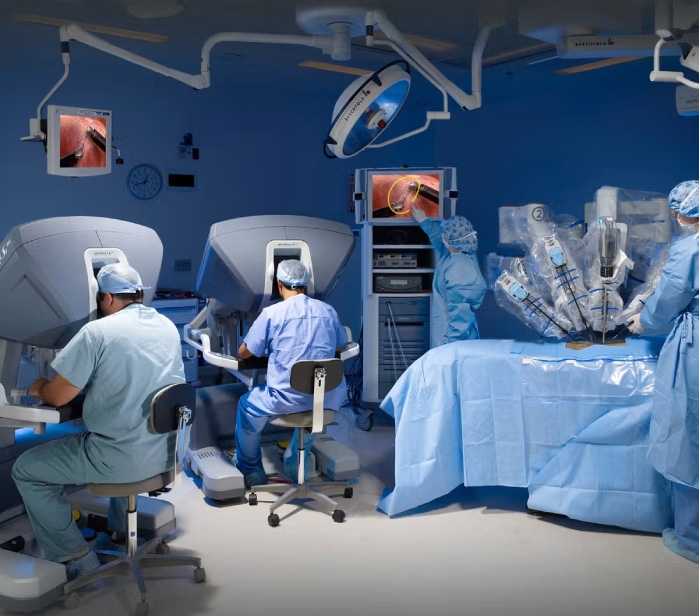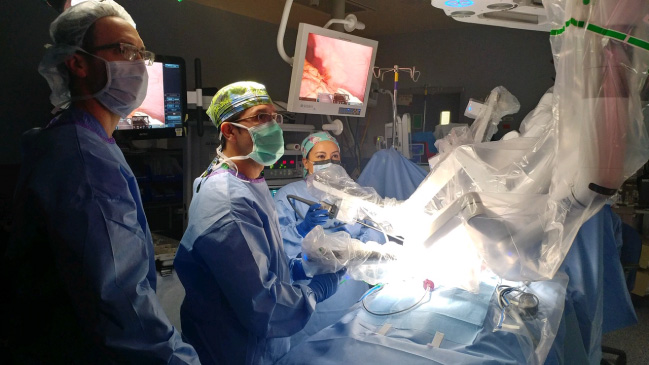Robotic surgery article published in the Bexar County Medical Society magazine in April 2025
What is Minimally Invasive Surgery (MIS)?
Minimally invasive surgery (MIS) is surgery done through little incisions using small surgical tools and telescopes. Some of the benefits of MIS are less surgical pain, less scarring, smaller incisions, quicker recovery with shorter hospital stays, and an earlier return to normal daily activities.
Surgeons who perform this type of surgery have undergone extensive specialized training, however they also know how to perform the same operations in the traditional open manner.

Newer technologies, such as robotic-assisted surgery, offer the potential for minimally invasive surgery to continue to improve and offer even more benefits to pediatric patients.
Minimally invasive surgery is not appropriate for all individuals. Your surgeon will be able to tell you in which cases it may be the best choice.
What are the types of MIS?
Laparoscopic Surgery
This is a common form of MIS in which small instruments and a telescope are passed through the body wall. The instruments are used by the surgeon who controls their movements, while watching them on a video screen. This form of MIS has been used widely in adults and children. In Pediatric Urology, this usually involves operations in the abdomen including surgery of the kidney, ureter, bladder and reproductive organs.
Endoscopic Procedures (Endourology)
This type of MIS typically involves using a scope passed through the body’s natural openings. In Pediatric Urology this mainly involves the structures of the urinary tract. These procedures include cystoscopy (looking inside the bladder), ureteroscopy (looking inside the ureter and kidney) and percutaneous nephroscopy (looking inside the kidney, by way of a small incision in the skin).
Endoscopic procedures in Pediatric Urology are used to treat disorders such as kidney and bladder stones, UTIs and vesicoureteral reflux, blockages of the urinary tract and for diagnostic purposes.
Robotic Assisted Surgery
Pediatric Robotic Surgery is one of the most exciting and promising areas in the field of minimally invasive surgery. Robotic technology make it ideally suited for use in a number of complex Pediatric Urology procedures.

The da Vinci® Surgical System provides surgeons with an alternative to both traditional open surgery and conventional laparoscopy, putting a surgeon’s hands at the controls of a state-of-the-art robotic platform. The da Vinci System enables surgeons to perform even the most complex and delicate procedures through very small incisions with unmatched precision.
For the patient, benefits may include:
- Significantly less pain
- Less blood loss
- Less scarring
- Shorter recovery time
- A faster return to normal daily activities
- And in many cases, better clinical outcomes

Addresses
Medical Center Office
Methodist Plaza Building
4499 Medical Dr Ste 360,
San Antonio TX 78229-3857
Stone Oak Office
Hardy Oak Medical Building
18626 Hardy Oak Boulevard, Ste 320,
San Antonio, TX 78258
New Braunfels Office:
Resolute Medical Plaza
545 Creekside Crossing, Ste 206,
New Braunfels, TX 78130
New Braunfels, TX 78130
Pediatric Urology of San Antonio © 2025. All Rights Reserved.
Made with ❤️ by TAF.